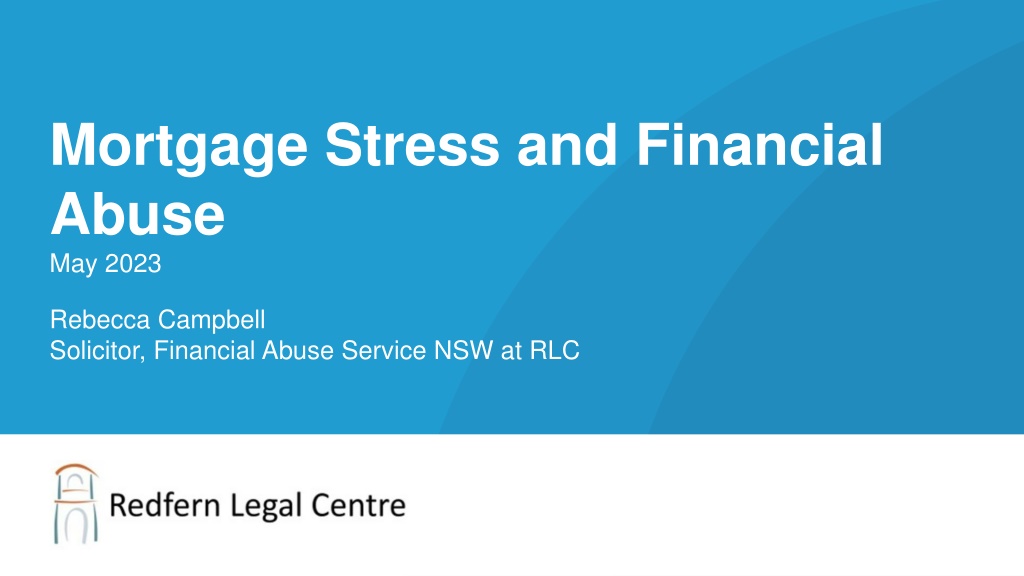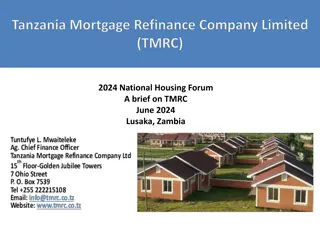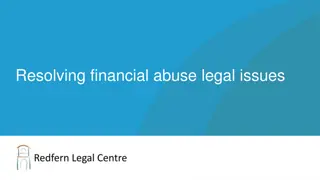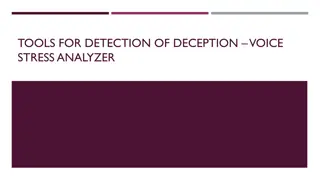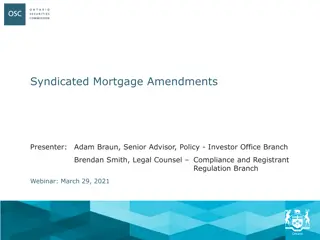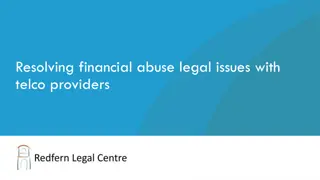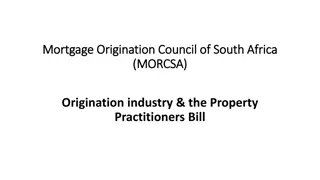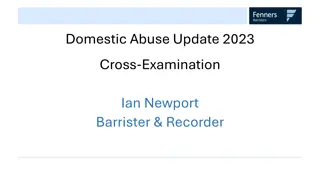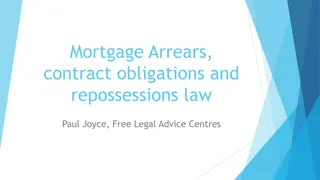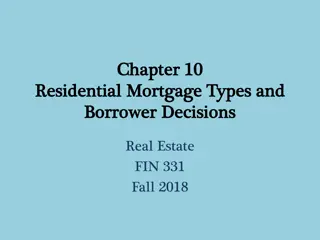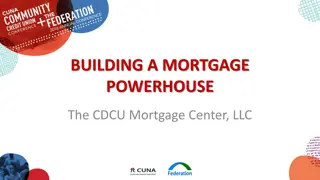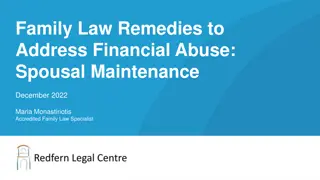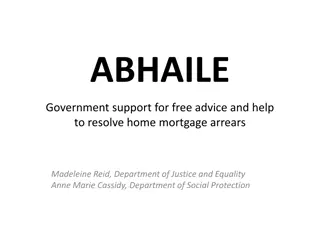Understanding Financial Abuse and Mortgage Stress: A Legal Perspective
Financial abuse, a form of domestic violence, involves using money to gain power and control. This abuse can continue to impact victims even after a relationship ends, affecting their credit and financial security. Rebecca Campbell, a solicitor at RLC, provides assistance including legal advice, representation, and referrals for individuals in NSW who have experienced financial abuse in intimate partner relationships.
Download Presentation

Please find below an Image/Link to download the presentation.
The content on the website is provided AS IS for your information and personal use only. It may not be sold, licensed, or shared on other websites without obtaining consent from the author. Download presentation by click this link. If you encounter any issues during the download, it is possible that the publisher has removed the file from their server.
E N D
Presentation Transcript
Mortgage Stress and Financial Abuse May 2023 Rebecca Campbell Solicitor, Financial Abuse Service NSW at RLC
Acknowledgement Of Country
Outline 1. 2. 3. 4. What is financial abuse What is mortgage stress Processes for default, sale and property settlement Mortgage stress and financial abuse: - When your client isn t on the loan - When your client isn t on the title 5. 6. Council rates and strata levies Questions RESOURCES: www.rlc.org.au/training/resources/financial-abuse
What is financial abuse
What is financial abuse? Financial or economic abuse is a form of domestic violence where an abuser uses money to gain power and to control their partner. Domestic violence is a pattern of abusive behaviour in an intimate relationship or other type of family relationship where one person assumes a position of power over another and causes fear It is often referred to as a pattern of coercion and control. (1800RESPECT) There is no single agreed legal definition of domestic violence in Australia.
The subtleties of financial abuse Can often be disguised as financial hardship or accepted as part of traditional gendered or cultural financial arrangements. Doesn't necessarily end with the relationship: consequences of financial abuse can continue for years, especially if the financial abuse has negatively impacted their credit score or eroded their financial security. Survivors can have no choice but to consolidate debts or take out payday loans to cover their living expenses, even years after the relationship.
How we assist Free, confidential legal advice (via telephone, Zoom, face-to-face) Co-advice appointments with experts in family law & credit / debt / consumer law Representation in eligible cases Available to all people in NSW who have experienced financial abuse in an intimate partner relationship Lawyers are trauma informed, understand safety risks and the complexities of abusive relationships Non-legal needs and social support referrals.
Mortgage Stress when interest repayment obligations consume a more than comfortable portion of a household budget - Forbes Rising interest rates and mortgage payments mean more people will be falling into mortgage stress For couples separating due to financial abuse, mortgage stress will make dealing with the family home more difficult We re going to go through the processes that apply to mortgage stress generally, then the process for property settlement. Then, I ll go through how financial abuse adds extra complexity.
Processes for default, sale and property settlement
When a payment is missed Expect a default notice in 30 days. Negotiate hardship or lodge with AFCA Missed Payment 30 days to pay arrears and regular payments, or the entire loan due Negotiate hardship or lodge with AFCA Default Notice Must respond within 28 days File a defence or lodge with AFCA Statement of Claim 30 days to vacate Negotiate, seek a set-aside, lodge with AFCA for more time to leave Notice to Vacate
Selling the home Negotiate with the bank for time to sell the home yourself Decide/forced to sell Get the home ready for sale Engage an agent List the home Contracts exchanged Accept an offer Buyer will pay the bank Any surplus to the seller Any deficit still owed Settlement
Property settlement Parties decide to separate. One moves out, they decide who will pay what towards the mortgage Separation Parties attend mediation to decide how to deal with the home Mediation If mediation fails, parties engage lawyers to file in the family court Property settlement Family Court issues orders regarding the home and other matrimonial property Orders
Mortgage stress and financial abuse when your client isn t on the loan or the title?
Mortgage stress and financial abuse Financial abuse makes clients more vulnerable to mortgage stress Clients may not have access to information Clients may not be on the loan or on the title, limiting their options Clients have a variety of legal and non-legal processes to go through Safety concerns and ADVOs
Mortgage stress and financial abuse: Examples Draining a joint offset account One partner mortgaging family home with a business lender One partner stops paying the joint mortgage Complex arrangements involving multiple properties Addressing these will often require consideration of both family law and credit and debt pathways.
Negotiate time to sell Find a new counsellor Missed payment Negotiate time to sell Statement of claim Mediation fails Victims services Real estate agent Family Court Orders Flee relationship ADVO Hearing File in family court Try to arrange mediation Obtain ADVO Contracts exchanged Negotiate time to sell Financial counsellor Get a DV caseworker settlement Default notice
Emmas story Emma was working before she met Jack and had a house deposit saved. After they married, she paid the deposit on their marital home. Both their names are on the home loan and the title. Jack pressured Emma to leave her job after the kids were born and be a stay at home mum. Emma became financially dependent on Jack, as all her savings had gone into the house deposit. Jack became increasingly controlling and abusive. Two weeks ago, while Jack was on remand for assaulting Emma, she obtained an ADVO that excludes Jack from living in the family home. Jack told her he has stopped paying the mortgage and she s going to get kicked out and lose the kids. He changed her passwords so she can t check the loan account online.
What can Emma do? Contact the bank to ask whether Jack has actually stopped paying. Ask where the process is up to. In this example, it appears to be early on. Assuming either there is no default, or the 30 days to rectify the default is still running, Emma can apply for financial hardship. Ask for time to go through family law proceedings. In this instance, Emma may seek an interim order that Jack continue paying the mortgage while a full property settlement is being negotiated.
Whose name is on the loan? Hardship Only person/s named on the loan can apply Notice Only person/s named on the loan will be sent notices Credit report Person/s named on the loan will be affected Client not sure? If your client doesn t know, help them to get their credit report If your client is on the loan but doesn t have oversight, contact the bank
Nitas story Nita is a stay-at-home mum and her husband Bill has always looked after the finances. Bill has the key to the mailbox and takes care of everything official. If Nita gets a letter, he passes it on to her. Nita doesn t like this system, but Bill yells at her if she asks to change it. One day, Nita finds a letter addressed to Bill that he left lying around. It says the mortgage is in arrears and Bill has 30 days to pay the entire balance. Nita confronts Bill and he starts yelling and becomes aggressive. The neighbours call the police who issue an ADVO. Nita wants to leave Bill but has nowhere else to live.
Whose name is on the title? Selling the home: Only the person/s named on the title can sell the home Surplus funds: The person/s named on the title will control the surplus funds after sale Client not sure? If your client doesn t know, help them to do a title search Responsible lending: If you client is on the loan but not the title o Possible responsible lending breach o AFCAs approach to joint facilities and family violence o Challenge: benefit hard to calculate
Jakes story Jake met Matt soon after Matt had divorced his husband. The relationship moved fast and Jake moved in while Matt was in the process of refinancing his home to remove his ex-husband from the loan. Matt had trouble getting the home refinanced in his sole name, so he pressured Jake to go onto the mortgage with him. Matt quit his job and soon Jake was paying the mortgage and all joint living expenses. After 5 years of escalating abuse, Jake decided to leave Matt and went to see a lawyer, only to discover that he had never been on the title to property and had limited rights.
Responsible lending Lenders have responsible lending obligations (s130 NCCPA): Make reasonable inquiries of the consumer s requirements and objectives Make reasonable inquiries about the consumer s financial situation Take reasonable steps to verify the consumer s financial situation. AFCA s approach to joint facilities and family violence Benefit difficult to quantify
Council rates and strata levies
Council rates and strata fees Debts to the council or to strata can cause big problems: Large amounts No ADR scheme, court only. Considerations: Whose name is the debt in? Where is the debt collection process up to? Is the amount owing over $10,000? (bankruptcy risk).
The process: Missed payment rates or strata Negotiate a repayment plan Missed Payment Negotiate a repayment plan Letter of demand Must respond within 28 days File a defence or apply to pay by installments Statement of Claim Seek a set aside (limited circumstances) Judgement 28 days after judgement Negotiate a repayment plan Risk of bankruptcy, depending on size of debt Enforcement
Emmas story Recap: Emma and Jack jointly own a home and are both on the mortgage. After separating due to DFV, Emma stayed in the home and Jack stopped paying the mortgage. Emma sought a hardship variation from the bank and commenced a property settlement. New development: Emma received a letter from the local council addressed to her and Jack, stating that they are $15,000 in arrears on their council rate payments and need to pay within 14 days, or the council may take them to court.
Questions and further resources Rebecca Campbell Solicitor Financial Abuse Service NSW Redfern Legal Centre RESOURCES: www.rlc.org.au/training/resources/financial-abuse
How to contact the Financial Abuse Service NSW 1. Website, including online form: https://rlc.org.au/fas 2. Call: 0481 730 344 3. Email: falsintake@rlc.org.au
Questions and further resources Rebecca Campbell Solicitor Financial Abuse Service NSW Redfern Legal Centre RESOURCES: www.rlc.org.au/training/resources/financial-abuse
Before You Go Your feedback helps us improve our training. Please stay with us for another 30 seconds Training: rlc.org.au/what-we-do/training Enquiries: Nick Manning education@rlc.org.au This webinar is a guide to the law in Australia. It is not a substitute for legal advice. If you have a legal problem, seek legal advice from a legal centre or Legal Aid.
